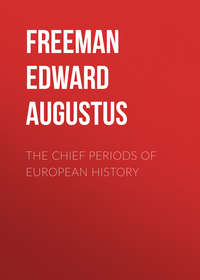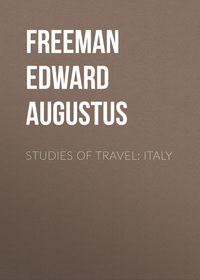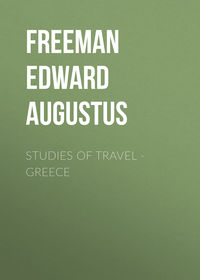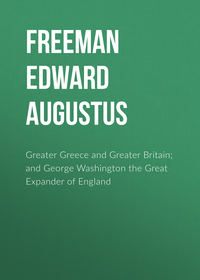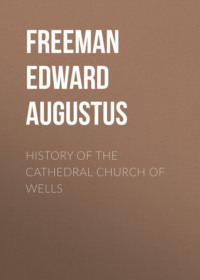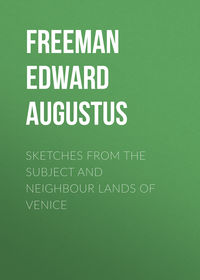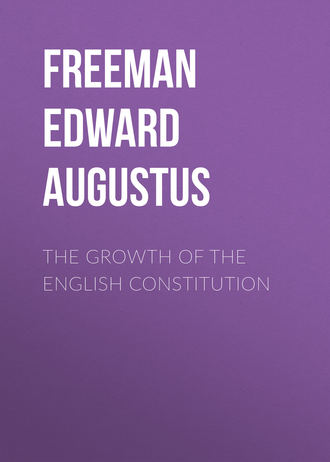 полная версия
полная версияThe Growth of the English Constitution
The last King who could bring even the shadow of a claim to have been chosen by the voice of the people beneath the canopy of heaven was no other than Richard the Third. The last King who could bring a better claim to have been chosen by the same voice beneath the vault of the West Minster was no other than Henry the Eighth. Down to his time the old ecclesiastical form of choosing the King remained in the coronation-service, and it was not wholly out of character that Henry should issue a congé d’élire for his own election. The device for Henry’s coronation survives in his own handwriting, and, while it contains a strong assertion of his hereditary right, it also contains a distinct provision for his election by the people in ancient form171. The claim of Henry was perfectly good, for a Parliament of his father’s reign had declared that the Crown should abide in Henry the Seventh and the heirs of his body172. But it was in his case that the hereditary and parliamentary claim was confirmed by the ancient rite of ecclesiastical election for the last time in our history. His successor was not thus distinctly chosen. This was perhaps, among other reasons, because in his case the form was specially needless. For the right of Edward the Sixth to succeed his father was beyond all dispute. By an exercise of parliamentary power, which we may well deem strange, but which was none the less lawful, Henry had been entrusted with the power of bequeathing and entailing the Crown as he thought good. That power he exercised on behalf of his own children in order, and, failing them and their issue, on the issue of his younger sister173. Edward, Mary, Elizabeth, therefore all reigned lawfully by virtue of their father’s will. A moment’s thought will show that Mary and Elizabeth could not both reign lawfully according to any doctrine of hereditary succession. On no theory, Catholic or Protestant, could both be the legitimate daughters of Henry. Parliament indeed had declared both to be illegitimate; on any theory one or the other must have been so174. But each reigned by a perfectly lawful title, under the provisions of the Act which empowered their father to settle the succession according to his pleasure. While Elizabeth reigned, almost divine as she might be deemed to be in her own person, it was at least not held that there was any divine right in any other person to succeed her. The doctrine which came into vogue under her successors was in her day looked upon as treasonable175. Elizabeth knew where her strength lay, and the Stewarts knew where their strength, such as it was, lay also. In the eye of the Law the first Stewart was an usurper; he occupied the Crown in the teeth of an Act of Parliament still in force, though he presently procured a fresh Act to salve over his usurpation176. There can be no doubt that, on the death of Elizabeth, the lawful right to the Crown lay in the house of Suffolk, the descendants of Henry’s younger sister Mary. But the circumstances of the time were unfavourable to their claims; by a tacit agreement, politically convenient, but quite in the teeth of the existing Law, the Crown silently passed to the King of Scots, the descendant of Henry’s elder sister Margaret. She had not been named in Henry’s entail; her descendants therefore, lineal heirs of William and Cerdic as they were, had no legal claim to the Crown beyond what was given them by the Act of Parliament which was passed after James was already in possession. They were therefore driven, like the Yorkists at an earlier time, to patch up the theory of the divine right of hereditary succession, in order to justify an occupation of the throne which had nothing to justify it in English Law177.
On one memorable day a Stewart King was reminded that an English King received his right to reign from the will of the English people. Whatever else we may say of the nature or the acts of the tribunal before which Charles the First was arraigned, it did but assert the ancient Law of England when it told how “Charles Stewart was admitted King of England, and therein trusted with a limited power, to govern by and according to the laws of the land and not otherwise.” It did but assert a principle which had been acted on on fitting occasions for nine hundred years, when it told its prisoner that “all his predecessors and he were responsible to the Commons of England.” Forgetful of the fate of Sigeberht and Æthelred, of Edward and of Richard, Charles ventured to ask for precedents, and told his judges that “the Kingdom of England was hereditary and not successive” 178. After a season, the intruding dynasty passed away, on that great day when the English people exercised for the last time its ancient right of deposing and electing Kings. The Convention of which we have so often spoken, that great Assembly, irregular in the eyes of lawyers, but in truth all the more lawful because no King’s writ had summoned it, cast all fantasies and subtleties to the winds by declaring that the throne was vacant. A true Assembly of the nation once more put forth its greatest power, and chose William of Orange, as, six hundred years before, another Assembly of the nation had chosen Harold the son of Godwine. The cycle had come round, and the English people had won back again the rights which their fathers had brought with them from their old home beyond the sea. Nor was it without fitness that their choice went back to those kindred lands, and that a new William crossed the sea to undo, after so many ages, the wrongs which England had suffered from his namesake. And now, under the rule of an elective King, England could at last afford to make her Crown strictly and permanently hereditary. The Act of Settlement, as we all know, entailed the Crown on the Electress Sophia and her heirs179. Therefore no Kings have ever reigned by a better right than those who, by virtue of that Act, have been called to reign by the direct operation of the Law. They are in truth Kings —Cyningas in the most ancient sense – whose power flows directly from the will of the nation. In the existing state of our institutions, the hereditary character of our modern kingship is no falling away from ancient principles; it in truth allows us to make a fuller application of them in another shape. In an early state of things no form of government is so natural as that which we find established among our forefathers. A feeling which was not wholly sentimental demanded that the King should, under all ordinary circumstances, be the descendant of former Kings. But a sense that some personal qualification was needed in a ruler required that the electors should have the right of freely choosing within the royal house. In days when Kings governed as well as reigned, such a choice, made with some regard to the personal qualities of the King chosen, was the best means for securing freedom and good government. Under the rule of a conventional constitution, when Kings reign but do not govern, when it is openly professed in the House of Commons that it is to that House that the powers of government have passed180, the objects which were once best secured by making kingship elective are now best secured by making kingship hereditary. It is as the Spartan King said: by lessening the powers of the Crown, its possession has become more lasting181. A political system like ours would be inconsistent with an elective kingship. An elective King could not be trusted simply to reign; he would assuredly govern, or try to govern. We need not suppose that he would attempt any breaches of the written Law. But those powers which the written Law attaches to the Crown he would assuredly try to exercise according to his own personal views of what was right and expedient. And he would assuredly be justified in so doing. For the personal choice of a certain man to be King would in all reason be held to imply that he was personally fit for the work of government. He would be a President or Prime Minister chosen for life, one whom there would be no means of removing from office except by the most extreme and most unusual exercise of the powers of Parliament. There are states of society in which an elective Monarchy is a better kind of government than either a Commonwealth or an hereditary Monarchy. But, under the present circumstances of the civilized states of Europe and America, the choice lies between the hereditary Monarchy and the Commonwealth. The circumstances of our history have made us an hereditary Monarchy, just as the circumstances of the history of Switzerland have made that country a Federal Commonwealth. And no reasonable person will seek to disturb an institution which, like other English institutions, has grown up because it was wanted182. Our unwritten Constitution, which gives us an hereditary Sovereign, but which requires his government to be carried on by Ministers who are practically chosen by the House of Commons, does in effect attain the same objects which were sought to be attained by the elective kingship of our forefathers. Our system gives the State a personal chief, a personal embodiment of the national being, which draws to itself those feelings of personal homage and personal duty which a large class of mankind find it hard to look upon as due to the more abstract ideas of Law and Commonwealth. And, when the duties of constitutional royalty are discharged as our own experience tells us that they may be discharged, the feeling awakened is more than a mere sentiment; it is a rational feeling of genuine personal respect. But widely as the hereditary kingship of our latest times differs in outward form from the hereditary kingship of our earliest times, the two have points of likeness which are not shared by kingship in the form which it took in the ages between the two. In our earliest and in our latest system, the King exists for the sake of the people; in the intermediate times it sometimes seemed that the people existed for the sake of the King. In our earliest and in our latest system, the King is clothed with an office, the duties of which are to be discharged for the common good of all. In the intermediate times it sometimes seemed as if the King had been made master of a possession which was to be enjoyed for his personal pleasure and profit. In the intermediate times we constantly hear of the rights and powers of the Crown as something distinct from, and almost hostile to, the common rights of the people. In our earliest and in our latest times, the rights of the Crown and the rights of the people are the same, for it is allowed that the powers of the Crown are to be exercised for the welfare of the people by the advice and consent of the people or their representatives. Without indulging in any Utopian dreams, without picturing to ourselves the England of a thousand years back as an earthly paradise, the voice of sober history does assuredly teach us that those distant times have really much in common with our own, much in which we are really nearer to them than to times which, in a mere reckoning of years, are far less distant from us. Thus it is that the cycle has come round, that the days of foreign rule have been wiped out, and that England is England once again. Our present Sovereign reigns by as good a right as Ælfred or Harold, for she reigns by the same right by which they reigned, by the will of the people, embodied in the Act of Parliament which made the crown of Ælfred and Harold hereditary in her ancestress. And, reigning by the same right by which they reigned, she reigns also for the same ends, for the common good of the nation of which the Law has made her the head. And we can wish nothing better for her kingdom than that the Crown which she so lawfully holds, which she has so worthily worn among two generations of her people, she may, like Nestor of old, continue to wear amid the well-deserved affection of a third183.
1
What I say of Uri and the other democratic Cantons must not be misunderstood, as if I all accepted the now exploded dreams which made out the Waldstädte or Forest Cantons to have had some special origin, and some special independence, apart from the rest of Germany. The researches of modern scholars have shown, not only that the Forest Cantons were members of the Empire like their neighbours, but that various lesser lords, spiritual and temporal, held different rights within them. Their acquisition of perfect independence, even their deliverance from other lords and promotion to the state of Reichsunmittelbarkeit or immediate dependence on the Empire, was a work of time. Thus Uri itself, or part of it, was granted in 853 by Lewis the German to the Abbey of Nuns (Fraumünster) in Zürich, and it was not till 1231 that its independence of any lord but the Emperor was formally acknowledged. But the universal supremacy of the Empire in no way interfered with the internal constitution of any district, city, or principality; nor was such interference necessarily implied even in subjection to some intermediate lord. The rule of a female monastery especially would be very light. And from the earliest times we find both the men of Uri in general and the men of particular parts of the district (Gemeinden, Communes, or parishes) spoken of as communities capable of acting together, and even of treating with those who claimed to be their masters. (“Nos inhabitantes Uroniam” appear in a deed of 955 as capable of making an agreement with the officer of the Abbey at Zürich.) All this is in no way peculiar to the Forest Cantons; it is no more than what we find everywhere; what is peculiar is that, whereas elsewhere the old local communities gradually died out, in the Forest Cantons they lived and flourished, and gained new rights and powers till they grew into absolutely independent commonwealths. I think therefore that I have a right to speak of the democracy of Uri as immemorial. It is not immemorial in its fully developed shape, but that fully developed shape grew step by step out of earlier forms which are strictly immemorial and common to the whole Teutonic race.
On the early history of the democratic Cantons, a subject than which none has been more thoroughly misunderstood, I am not able to point to any one trustworthy work in English. Among the writings of Swiss scholars – shut up for the most part from readers of other nations in the inaccessible Transactions of local Societies – there is a vast literature on the subject, of the whole of which I am far from pretending to be master. But I may refer to the Essai sur l’Etat des Personnes et la Condition des Terres dans le Pays d’Ury au XIIIe Siècle, by the Baron Frederick de Gingins-la-Sarraz, in the Archiv für schweizerische Geschichte, i. 17; to Dr. J. R. Burckhardt’s Untersuchungen über die erste Bevölkerung des Alpengebirgs in the same collection, iv. 3; to the early chapters of the great work of Bluntschli, Geschichte des schweizerischen Bundesrechtes (Zürich, 1849), and of Blumer’s Staats-und Rechtsgeschichte der schweizerischen Demokratien (St. Gallen, 1850); to Dr. Alfons Huber, Die Waldstaette (Innsbruck, 1861), and Dr. Wilhelm Vischer, Die Sage von der Befreiung der Waldstädte (Leipzig, 1867). Dr. H. von Liebenau, in Die Tell-Sage zu dem Jahre 1230, takes a line of his own. The results of the whole inquiry will be found in the most accessible form in M. Albert Rilliet’s Les Origines de la Confédération Suisse (Genève et Bâle, 1868).
2
Individual Swiss mercenaries may doubtless still be found in foreign armies, as Italy some years back knew to her cost. But the Federal Constitution of 1848 altogether swept away the system of military capitulations which used to be publicly entered into by the Cantons.
3
See Johannes von Müller, Geschichte der schweizerische Eidgenossenschaft, Book v., c. 1 (vol. xvi. p. 25, of his sämmtliche Werke, Stuttgart und Tübingen, 1832, and the note in vol. xxii. p. 14; or the French translation, vol. viii. p. 35: Paris and Geneva, 1840). The description in Peterman Etterlin’s Chronicle, p. 204 (Basel, 1752), is worth quoting in the original. “Dann do der Hertzog von Burgunn gesach den züg den berg ab züchen, schein die sunn gerad in sy, und glitzet als wie ein spiegel, des gelichen lüyet das horn von Ury, auch die harschorne von Lutzern, und was ein sölich toffen, das des Hertzogen von Burgunn lüt ein grusen darab entpfiengent, und trattent hinder sich.”
4
The magistrates rode when I was present at the Landesgemeinden of 1863 and 1864. I trust that so good a custom has not passed away.
5
On the character and position of Phôkiôn, see Grote, xi. 382, xii. 481; and on the general question of the alleged fickleness of the Athenian people, see iv. 496.
6
Some years ago I went through all the elections to the Bundesrath or Executive Council in Switzerland, and found that in eighteen years it had only twice happened that a member of the Council seeking reelection had failed to obtain it. I therefore think that I was right in congratulating a member of the Federal Council, whom I had the pleasure of meeting last year, on being a member of the most permanent government in Europe.
7
Under the so-called Helvetic Republic of 1798, the Cantons ceased to be sovereign States, and became mere divisions, like counties or departments. One of the earliest provisions of this constitution abolishes the ancient democracies of the Forest Cantons. “Die Regierungsform, wenn sie auch sollte verändert werden, soll allezeit eine repräsentative Demokratie sein.” (See the text in Bluntschli, ii. 305.) The “repräsentative Demokratie” thus forced on these ancient commonwealths by the sham democrats of Paris was meant to exclude the pure democracy of Athens and Uri.
The Federal system was in some sort restored by the Act of Mediation (Vermittlungsakte) of Napoleon Buonaparte, when First Consul in 1803. See the text in Bluntschli, ii. 322.
8
Appenzell, though its history had long been connected with that of the Confederates, was not actually admitted as a Canton till December 1513, being the youngest of the thirteen Cantons which formed the Confederation down to 1798. See Zellweger, Geschichte des Appenzellischen Volkes, ii. 366, and the text in his Urkunden, ii. part 2, p. 481, or in the older Appenzeller Chronick of Walser (Saint Gallen, 1740), 410, and the Act in his Anhang, p. 18. The frontispiece of this volume contains a lively picture of a Landesgemeinde. In 1597 the Canton was divided into the two Half-cantons of Ausser-Rhoden, Protestant, and Inner-Rhoden, Catholic. See Zellweger, iii. part 2, p. 160; Walser, 553.
9
On armed assemblies see Norman Conquest, ii. 331.
10
I perhaps need hardly insist on this point after the references given in my first note; but I find it constantly needful to explain that there is no such thing as a Swiss nation in any but a political sense. The Cantons were simply members of the Empire which gradually won a greater independence than their fellows. And the Forest Cantons, and the German-speaking Swiss generally, do not even form a distinct part of the German nation; they are simply three settlements of the Alemanni, just as the three divisions of Lincolnshire are three settlements of the Angles.
11
The earliest instance that I know of the use of the word Englaland is in the Treaty with Olaf and Justin in 991. Its earliest use in the English Chronicles is in 1014. See Norman Conquest, i. 78, 276, 605, 629. The oldest use that I know of the name Yorkshire (Eoforwicscír) is in the Chronicles under 1065. See Norman Conquest, ii. 478. Deira is, of course, as old as Gregory the Great’s pun.
12
The real history of English parishes has yet to be worked out. I feel sure that they will be found to have much more in common with the continental Gemeinden than would seem at first sight. Some hints may be found in a little pamphlet which I lately came across, called “The Parish in History.”
13
The nature of democracy is set forth by Periklês in the Funeral Oration, Thucydides, ii. 37: ὄνομα μὲν διὰ τὸ μὴ ἐς ὀλίγους ἀλλ' ἐς πλείονας οἰκεῖν δημοκρατία κέκληται· μέτεστι δὲ κατὰ μὲν τοὺς νόμους πρὸς τὰ ἴδια διάφορα πᾶσι τὸ ἴσον, κατὰ δὲ τὴν ἀξίωσιν ὡς ἕκαστος ἐν τῷ εὐδοκιμεῖ. It is set forth still more clearly by Athênagoras of Syracuse, vi. 39, where the functions of different classes in a democracy are clearly distinguished: ἐγὼ δέ φημι πρῶτα μὲν δῆμον ξύμπαν ὠνομάσθαι, ὀλιγαρχίαν δὲ μέρος, ἔπειτα φύλακας μὲν ἀρίστους εἶναι χρημάτων τοὺς πλουσίους, βουλεῦσαι δ' ἂν βέλτιστα τοὺς ξυνετοὺς, κρῖναι δ' ἂν ἀκούσαντας ἄριστα τοὺς πολλοὺς, καὶ ταῦτα ὁμοίως καὶ κατὰ μέρη καὶ ξύμπαντα ἐν δημοκρατίᾳ ἰσομοιρεῖν. Here a distinct sphere is assigned both to wealth and to special intelligence. Nearly the same division is drawn by a writer who might by comparison be called aristocratic. Isokratês (Areop. 29) holds that the management of public affairs should be immediately in the hands of the men of wealth and leisure, who should act as servants of the People, the People itself being their master – or, as he does not scruple to say, Tyrant– with full power of reward and punishment: ἐκεῖνοι διεγνωκότες ἦσαν ὅτι δεῖ τὸν μὲν δῆμον ὥσπερ τύραννον καθιστάναι τὰς ἀρχὰς καὶ κολάζειν τοὺς ἐξαμαρτάνοντας καὶ κρίνειν περὶ τῶν ἀμφισβητουμένων, τοὺς δὲ σχολὴν ἄγειν δυναμένους καὶ βίον ἱκανὸν κεκτημένους ἐπιμελεῖσθαι τῶν κοινῶν ὥσπερ οἰκέτας, καὶ δικαίους μὲν γενομένους ἐπαινεῖσθαι καὶ στέργειν ταύτῃ τῇ τιμῇ, κακῶς δὲ διοικήσαντας μηδεμιᾶς συγγνώμης τυγχάνειν, ἀλλὰ ταῖς μεγίσταις ζημίαις περιπίπτειν. This he elsewhere (Panath 166) calls democracy with a mixture of aristocracy – not oligarchy (τὴν δημοκρατίαν τὴν ἀριστοκρατίᾳ μεμιγμένην).
The unfavourable meaning which is often attached to the word democracy, when it does not arise from simple ignorance, probably arises from the use of the word by Aristotle. He makes (Politics, iii. 7) three lawful forms of government, kingship (βασιλεία), aristocracy (ἀριστοκρατία),and what he calls specially πολιτεία or commonwealth. Of these he makes three corruptions, tyranny, oligarchy, and democracy (τυραννίς, ὀλιγαρχία, δημοκρατία), defining democracy to be a government carried on for the special benefit of the poor (πρὸς τὸ συμφέρον τὸ τῶν ἀπόρων). In this there is something of a philosopher’s contempt for all popular government, and it is certain that Aristotle’s way of speaking is not that which is usual in the Greek historians. Polybios, like Herodotus and Thucydides, uses the word democracy in the old honourable sense, and he takes (ii. 38) as his special type of democracy the constitution of the Achaian League, which certainly had in it a strong element of practical aristocracy (see History of Federal Government, cap. v.): ἰσηγορίας καὶ παρρησίας καὶ καθόλου δημοκρατίας ἀληθινῆς σύστημα καὶ προαίρεσιν εἰλικρινεστέραν οὐκ ἂν εὕροι τις τῆς παρὰ τοῖς Ἀχαιοῖς ὑπαρχούσης. In short, what Aristotle calls πολιτεία Polybios calls δημοκρατία; what Aristotle calls δημοκρατία Polybios calls ὀχλοκρατία.
14
It follows that, when the commonwealth of Florence disfranchised the whole of the noble families, it lost its right to be called a democracy. See the passing of the Ordinance of Justice in Sismondi, Républiques Italiennes, iv. 65; Chroniche di Giovanni Villani, viii. 1.
15
On Slavery in England, see Norman Conquest, i. 81, 333, 368, 432, iv. 385. For fuller accounts, see Kemble’s Saxons in England, i. 185; Zöpfl, Geschichte der deutschen Rechtsinstitute, 62. The three classes of nobles, common freemen, and slaves cannot be better set forth than in the Life of Saint Lebuin (Pertz, ii. 361): “Sunt denique ibi, qui illorum lingua edlingi, sunt qui frilingi, sunt qui lassi dicuntur, quod in Latina sonat lingua, nobiles, ingenuiles, atque serviles.”
16
On the Wite-þeow, the slave reduced to slavery for his crimes, see Kemble, Saxons in England, i. 200. He is mentioned several times in the laws of Ine, 24, 48, 54, where, as usual in the West-Saxon laws, a distinction is drawn between the English and the Welsh wite-þeow. The second reference contains a provision for the case of a newly enslaved þeow who should be charged with a crime committed before he was condemned to slavery.


